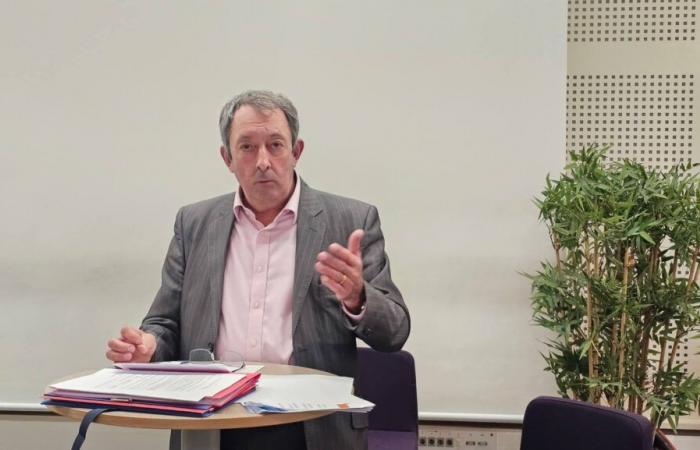
“I regret giving back the keys to my premises, I should have locked myself in and set it on fire.” These words of distress, Aymeric Berger (photo), president of Apesa 94 and vice-president of the Commercial Court, heard them while he was preparing to pronounce the judicial liquidation of the entrepreneur. At the end of the hearing, he came back to see him to talk. “Sometimes you just need to put the words down and play down the drama to get back on top,” testifies the entrepreneur, who organized a meeting to present the association at the end of December. Sometimes more is needed, professional psychological help is necessary.
Inextricable problems that accumulate
Even before judicial liquidation, there is no shortage of sources of stress and distress for business leaders: unpaid debts, loss of a major client, cash flow problems, legal proceedings… So many hassles which end up giving the impression that we no longer have any room for maneuver. “An infernal spiral in which we feel overwhelmed and where the only way out ends up being to disappear ourselves”summarizes Aymeric Berger. The challenge is to transform this distress into a new life, to find a reason for being, a reason for being, a reason for being there.”
Supporting the manager in distress in this psychological rebound is precisely the challenge of the Psychological Assistance for Entrepreneurs in Acute Suffering association. It was in 2013 that the first Apesa saw the light of day, at the initiative of the clerks of the Saintes commercial court, in conjunction with psychologists. Since 2016, the initiative has taken on a national dimension and today brings together 96 local associations, all independent. In Val-de-Marne, the movement was driven by the president of the Commercial Court and the chief registrars.
Identifying distress, beyond the facade of everything is fine
The first step consists of identifying this distress, which is not obvious. Modesty, ego? It’s difficult to confide your difficulties when you always have to be pumped up to inspire confidence. “The last time I exhibited at the building fair and I asked my colleagues how things were going, everyone said to me: ‘It’s going well, it’s going well’. Until I finally said, ‘Am I the only one who finds the situation complicated right now?’ It was the trigger for everyone to confide in the difficulties of the moment,” confides Sally Bennacer, president of the CCI of Val-de-Marne and director of Art & Blind.
Sentinels trained to ask the right questions
To detect signals of psychological distress, the association relies on volunteer sentinels, whose profession or associative commitment leads them to work alongside leaders. At the national level, the Apesa have 15,000 sentinels. In Val-de-Marne, around fifteen people keep watch. “It’s not easy to start the conversation about difficulties, confirms Florence Goltzmann, collaborator of Medef in Eastern Paris, and sentinel. But, after an hour, an hour and a half, people reveal themselves despite everything.”
Each sentinel is first trained by clinical psychologists in order to learn how to ask the right questions. Those which will eventually lead to asking: “Have you thought about suicide?” If the situation seems critical, the sentinel triggers an alert form with the association. “I had someone tell me: – yes, I think about it every day”, confides Aymeric Berger.
Total seal between whistleblowers and psychologists
Once the alert sheet has been triggered, it is transmitted to an association of psychologists who take over. They contact the managers concerned and offer follow-up for a maximum of five sessions. “Once the alert sheet is sent, we have no information on what happens. The only feedback we have are the factors sent by the association of psychologists, which allow us to know how many people have been followed, but we do not even know which of those who have been reported”indicates Aurélie Gossin, chief clerk at the Commercial Court, and sentinel. A “essential sealing”, insists Aymeric Berger, both sentinel and judge at the Commercial Court. “This allows us to continue to operate in complete independence.”
Already eleven alerts and six people helped in Val-de-Marne
“In total, Apesa 94 transmitted six alert sheets in 2024 and five in 2023”, figure Aurélie Gossin. Four people agreed to be psychologically helped in 2024, after two in 2023. If the majority of alerts came from internal sentinels at the commercial court, most often at the time of a judicial liquidation, two alerts also came from external sentinels in court. An already active assessment for the young association, marked by the disappearance of the first president of Apesa 94, Christian Fosse, former first vice-president of the Commercial Court.
Beyond psychological help, rely on the Commercial Court before reaching liquidation
The vice-president of the Commercial Court also recalls that before reaching judicial liquidation, a painful step for business leaders, it is possible to be accompanied by the Court, in complete confidentiality, to have , for example, an agent for this or a conciliator in order to negotiate the debts, always in complete confidentiality, with Urssaf or the bank, if it is only a temporary cash flow problem, or to clarify the situation, in order to anticipate decisions when you still have a choice.
“In judicial liquidation, we find ourselves confronted with ourselves, confides a former restaurant manager, who went out of business after legal proceedings. Fortunately I had children still at school, I told myself that I had to fight, but it was a very complicated time. I am very happy that today there is an association” to help people in distress, he continues. Today I bounced back. I am self-employed in renewable energies, and work a little in catering, but not as a manager.”
Call for donations and volunteers
At the start of 2025, Apesa 94 is looking for new members, sentinels, and is also calling for donations to pay psychologists. “A life costs 425 euros”, summarizes Aymeric Berger, about the price of the five psychological monitoring sessions.
To make a tax-deductible donation, or offer to become a sentinel, when in contact with business leaders, send an email to [email protected]





